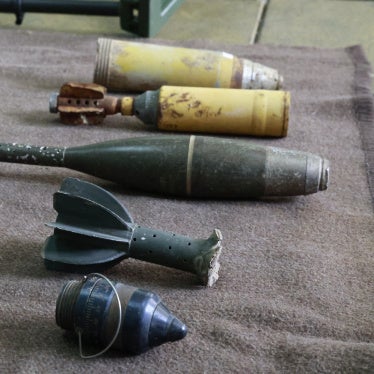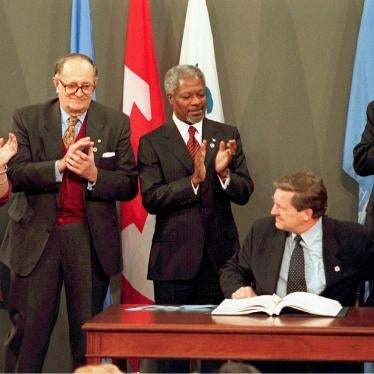(Geneva) – An attempt by the United States and others to weaken the comprehensive ban on cluster munitions has failed, Human Rights Watch said today. The effort by the US and other users and stockpilers of cluster munitions to create a new protocol to the 1980 Convention on Conventional Weapons (CCW) was rejected on November 25, 2011, in Geneva after more than 50 states said there was no consensus for adopting it.
The draft protocol had been developed, discussed, and negotiated over the past four years as a response, and an alternative, to the 2008 Convention on Cluster Munitions, which comprehensively bans all use, production, stockpiling, and trade of all cluster munitions.
“The proposed law would have posed serious threats to civilians living in conflict by promoting increased use of cluster munitions,” said Steve Goose, Arms director at Human Rights Watch, and chair of the international Cluster Munition Coalition (CMC). “It's remarkable and gratifying that so many nations put humanitarian concerns above other interests and resisted the pressures of the major military powers.”
The convention banning cluster munitions has been signed or ratified by 111 nations, including some of the biggest users, producers, and stockpilers of cluster munitions in recent decades, such as the United Kingdom, Germany, France, and the Netherlands. Twenty of 28 NATO members have joined the ban convention.
The United States, Russia, China, India, Israel, and a few other nations attempted to cut a deal in which they would ban cluster munitions produced before 1980, but be given specific legal authorization to use all of their other cluster munitions. That would have included the vast majority of their arsenals, many millions of cluster munitions containing many hundreds of millions, perhaps billions, of submunitions. Nearly all of these types of cluster munitions have already been well-documented by Human Rights Watch and others to have caused extensive harm to civilians in conflicts in the past decade in Afghanistan, Iraq, Lebanon, and Georgia. They were banned in 2008 by the Convention on Cluster Munitions.
A powerful alliance comprised of Norway, Austria, Mexico, and about 50 other governments, as well as several UN agencies (most notably the UN Development Programme), the International Committee of the Red Cross (ICRC), and the CMC, led by Human Rights Watch, fought the creation of the CCW protocol. In addition to highlighting the humanitarian harm that could be brought about by the proposed protocol, the alliance expressed strong concern that it represented a regression in international humanitarian law, and could have set a precedent where, for the first time, nations agreed to an international instrument with weaker provisions than one on the same subject that had already been adopted.
“It is a great day for those who care about the protection of civilians,” Goose said. “This protocol would have given political and legal cover to those who want to continue to use these weapons that have already caused so much human suffering.”








